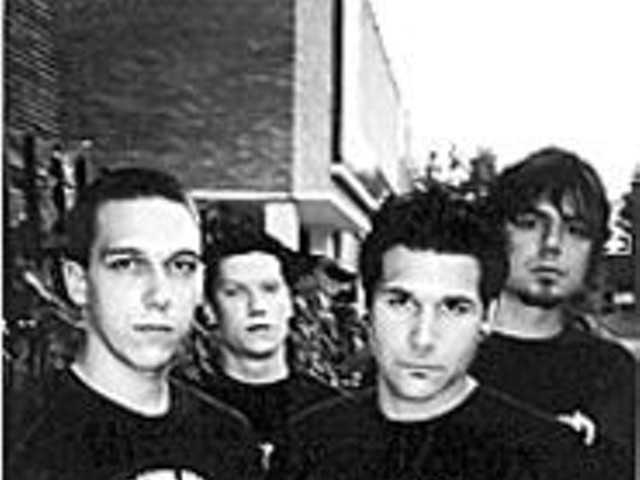But having returned from the band's latest European tour just this morning, Safer's also a little tired of life in the white-hot media spotlight. He's got laundry to do. Friends to catch up with. Bumming around the Bedford strip of his Williamsburg, Brooklyn stamping grounds -- that's a priority. Talking Rapture, not so much.
But Safer's a good soldier, even if he cops to some frustration.
"It kind of feels like we've been introducing ourselves for the past year and a half," he says in a sleep-deprived monotone. "Like, how many more times do I have to tell the story of my life before I get to live in the present? I mean, I know that to a lot of people, the Rapture are still breaking news. But it feels like at this point, maybe people could just know us."
Getting to know the Rapture is, happily for Safer, best accomplished by listening to the band's music. Listing the unremarkable biographical details of how the New York band came together won't teach you much about its magic. For instance, there's nothing to be gleaned from knowing that saxophonist Gabe Andruzzi is Safer's cousin. And the facts that founding Rapture members Luke Jenner and Vito Roccoforte have known each other since elementary school and made their big move out of San Francisco by booking a string of East-moving tour dates, until they landed, broke and jobless, in New York City, are not particularly instructive as to how their band wound up reclaiming disco hooks and four-on-the-floor electronic beats for rock music. To cite an oft-repeated anecdote, Luke's having camped out in his car under the Brooklyn Bridge reveals nothing regarding his John Lydon-meets-Robert Smith vocal technique, unless something particularly frightening happened on one of those nights in order to induce all those mangled yelps. And if so, he's not talking about it.
Perhaps most prosaically of all, the Rapture's collaboration with the DFA (Death From Above) came about just because, y'know, producers Tim Goldsworthy and James Murphy liked the band's music. Shrug. But the fruits of their labor with the band are not prosaic at all: On Echoes, the production duo is at once invisible and omnipresent, using a God-is-in-the-details approach to wringing every possible ounce of beat-driven grooviness out of the Rapture's songs.
"We work the same way with Tim and James that we do as a band," Safer explains. "We're all taking little parts of tracks and focusing on them with the idea of maybe making them swing more or trying to make it more manic. Really, what it amounts to is just hanging around for long periods of time and allowing for a certain amount of spontaneity to happen."
Despite the Rapture's nascent reputation as a studio band -- one of those outfits more finicky about recording gear than, say, personal grooming -- it can't be emphasized enough that much of what makes the band special is that it's passionate about playing live. Safer notes that much of the "spontaneity" audible in the music -- in its intensity and ricocheting energy -- comes out of the fact that most of the songs were designed to be performed and were tested and refined in front of live audiences.
"For us, the whole joy of seeing people play shows is in watching them make something," Safer says, "and not just miming to a backing track or something like that. So, in our own shows, we're not focused on everything being perfect -- we're much more about taking the stuff that we've created in the studio and figuring out how to make it playable. You know, using the machines as instruments, instead of just hitting buttons and then stepping back and letting it do its thing. And anyway, a lot of the songs on Echoes are ones that really grew out of our playing live."
Safer stresses the fact that the band's mode of working is strictly nonhierarchical. Anyone in the Rapture, he says, can bring in ideas for songs or suggest ways to make them better. It's in that freewheeling give-and-take that the magic happens -- but it's impossible to get at how it all works or what makes this band's dynamic different from that of any other band that hermits out in its practice space, doing what bands do: playing music, talking about music, arguing about music, drinking beer, and fucking around with their various pedals and filters and whatnot. The Rapture's secret ingredient remains elusive. Even Safer himself seems to agree.
"It's funny," he says. "When I first saw Luke and Vito perform down in D.C., I knew right off that I wanted to play with them. But I don't know why, exactly. When I look back, I mostly remember that they were from New York and I was moving there, and we knew some people in common. Obviously, there was more to it than that, like, their energy or something. But I'm not sure.
"And in the same way," he continues, "I don't think I know why the four of us work so well together, except that we really do work together. I think we all understand that we're four people who all have visions and musical interests that we could pursue individually, but we've all come to the realization that right now, what we're doing as a band is way, way more exciting."





